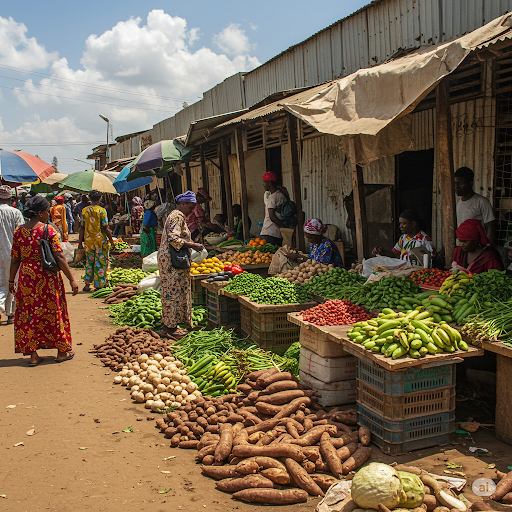Broadcasting
E-commerce Lessons for Scaling Nigeria’s Food Distribution

By Diana Tenebe, Chief Operating Officer, Foodstuff Store
Nigeria stands at the cusp of an agricultural revolution with the ambitious plan to significantly transform its food and agriculture sector through the launch of the $510 million Special Agro-Industrial Processing Zones (SAPZ), financed by the African Development Bank and development partners. Fueled by the integration of cutting-edge technologies aimed at boosting food production and ensuring national food security. However, as yields increase, a formidable hurdle remains: the efficient and scalable distribution of this bounty across the nation’s diverse landscapes, often hampered by infrastructural limitations and logistical complexities.

Dr. Bosun Tijani, the Minister of Communication, Innovation, and Digital Economy, recently called on Nigerian farmers to prepare for digital and technologically advanced farming methods, emphasising their crucial role in boosting food production and security. Building upon this call for technological integration, and to truly unlock the full potential of Nigerian agriculture and ensure increased harvests translate to accessible and affordable food for all, the sector can draw invaluable lessons from the operational prowess of e-commerce giants like Amazon. Their success in navigating complex logistics and reaching vast customer bases offers a compelling blueprint for transforming Nigeria’s food distribution network.
Amazon’s dominance in the e-commerce realm is underpinned by a meticulously crafted logistics and supply chain system. Their significant investments in sprawling fulfillment networks, coupled with the strategic deployment of technology for route optimisation and real-time inventory tracking, have created an unparalleled engine for moving goods swiftly and efficiently. Furthermore, their optimisation of last-mile delivery, integration of automation within warehouses, and a hybrid approach blending in-house capabilities with shrewd partnerships underscore their commitment to scalability. This intricate ecosystem is designed to handle massive volumes and adapt to fluctuating demands – a crucial capability that Nigeria’s agricultural sector desperately needs.
Translating these principles to the Nigerian context requires a fundamental shift towards building a resilient delivery infrastructure specifically tailored for agricultural produce. This necessitates moving beyond traditional, often inefficient methods and embracing hybrid transportation models that account for varying road conditions and geographical challenges. Imagine a network that leverages a combination of refrigerated trucks for long-haul transport, smaller vehicles for navigating local terrains, and even innovative solutions like riverine transport where feasible. Integrating technologies like GPS tracking for real-time visibility of produce movement and strategically establishing a network of collection and distribution hubs across key agricultural zones can significantly streamline the flow of goods.
Implementing robust systems for real-time tracking of harvests and produce, mirroring Amazon’s inventory management, will be crucial in minimising spoilage and maximizing freshness as food travels from farm to consumer. Moreover, forging strategic alliances with existing local logistics providers, leveraging their on-the-ground knowledge and infrastructure, can provide a vital springboard for building a comprehensive network without starting entirely from scratch.
Beyond the physical movement of goods, the power of data, a cornerstone of Amazon’s success, holds immense potential for revolutionising Nigerian food distribution. Leveraging data analytics can provide invaluable insights into regional demand patterns, allowing for more accurate forecasting of optimal harvest and distribution times. This data-driven approach can help match agricultural supply with consumer needs with greater precision, reducing waste and ensuring that the right produce reaches the right markets at the right time – much like Amazon utilizes data for personalized recommendations and understanding customer purchase behavior. Imagine farmers making informed decisions about planting based on predicted market demands or logistics providers optimizing routes based on real-time demand fluctuations.
Furthermore, adopting Amazon’s unwavering focus on customer convenience and trust is paramount, especially when dealing with perishable goods. Establishing reliable delivery schedules, ensuring the quality and freshness of produce upon arrival, and implementing transparent processes throughout the supply chain are crucial for building confidence among both farmers and consumers. This might involve implementing quality control measures at various stages, providing clear communication about delivery timelines, and potentially even exploring traceability systems that allow consumers to understand the journey of their food.
Finally, navigating the complexities and dynamism of the Nigerian market demands a long-term vision and a high degree of adaptability, mirroring Amazon’s sustained focus and agility in the ever-evolving e-commerce landscape. The Nigerian agricultural sector must be prepared to iterate, learn from its experiences, and continuously refine its distribution strategies in response to local challenges and opportunities. This requires a collaborative approach involving government agencies, agricultural organisations, technology providers, and logistics companies working together to build a sustainable and efficient food distribution ecosystem.
By strategically adapting these e-commerce-inspired lessons in logistics, technology adoption, data-driven decision-making, and customer focus to the unique context of Nigerian agriculture, the nation can forge a distribution system capable of efficiently handling increased production. This transformative approach is not merely about moving food; it’s about ensuring that the fruits of Nigeria’s agricultural advancements reach every corner of the country, contributing significantly to food security, mitigating the rising cost of food, and ultimately cultivating a thriving and efficient agricultural future for all Nigerians.
Broadcasting
DG NCC Tasks University Dons on Research Commercialization, IP Management to Build Global Competitive Ecosystems

Dr. John Asein, director-general, Nigerian Copyright Commission (NCC), has charged universities to leverage Intellectual Property (IP), innovation management and research commercialisation to build vibrant, sustainable and globally competitive ecosystems.

The DG stated this while delivering a paper on: ‘’Research Commercialisation, IP Policy and Innovation Management’’ at the Committee of Vice-Chancellors of Nigerian Universities (CVCNU) organised Business Clinic themed: Unlocking University-Driven Business Ecosystems: Innovation, Partnerships and Sustainable Enterprise Models in Abuja.
The programme was targeted at engaging Vice-Chancellors, principal officers and other key officers in Nigerian Universities in a practical dialogue on how to transit their institutions into thriving business ecosystems through innovation, enterprise development and strategic partnerships.
In his presentation, Dr. Asein, disclosed that Universities are now recognised as engines of national development and innovation hubs that must connect scholarship to business.
He noted that with over 300 Universities in Nigeria, there is need for structured pathways to turn ideas into commercial outcomes while attention should be focused on IP assets in our universities in order to harness them in a safe, sustainable and satisfactory manner.
The DG NCC speaking further on leveraging resources from the creativity locked up within the university system, harped on the need to harness the soft power of our youth as Nigeria’s most valuable natural resources are its people.
Drawing demography from Nigeria youthful population, he observed that over 70 percent of Nigerians who are under the age of 30 are mostly in the university system studying. These youths, he noted, shape cultures, technology and innovation through creativity and digital skills.
He tasked universities to become innovation factories where young people can explore ideas, protect their IP and grow startups by integrating innovation culture, entrepreneurship training and IP awareness into its learning environment.
He equally urged Universities to look beyond the sciences to commercialize traditional knowledge-based innovations and harness the potentials in the creative arts disciplines like music, visual arts, theatre arts and others for commercial outcomes.
Dr. Asein, recommended that universities as centres of learning, should take the lead in using the IP system for promoting education and learning, wealth creation, revenue generation and institutional development.
Underscoring the need for all universities to have an IP Policy, he noted that the Model developed by the Nigerian Copyright Commission in partnership with the CVCNU is a good starting point.
The Secretary-General, CVCNU, Prof. Andrew Haruna, presented the welcome address at the event while the Director, Technology Innovation and Commercialisation, NOTAP, Mrs. Adah H.N. Mokolo-Oladunke represented the Director-General, NOTAP at the event.
The 2025 CVCNU Business Clinic witnessed attendance from representatives of Public and Private Universities across the 36 States in Nigeria.
Broadcasting
US invests $115m in counter-drone tech for World Cup security


Drone
The US Department of Homeland Security (DHS) will invest $115 million in counter-drone technology to safeguard the 2026 FIFA World Cup and events marking America’s 250th independence anniversary, creating a dedicated office for rapid drone system deployment.
Homeland Security Secretary Kristi Noem described drones as “the new frontier of American air superiority,” stressing the need to counter threats from drug cartels using unmanned aircraft for smuggling and surveillance, alongside incidents like a 2025 NFL stadium drone flight and 2024 New Jersey sightings.
The funding supports 11 World Cup host cities expecting over one million visitors, building on FEMA’s $250 million grants to those states and addressing risks heightened by cartels’ advancing tech, including a reported FBI tracking plot in Mexico.
DHS has conducted over 1,500 counter-drone missions since 2018, with the new Program Executive Office accelerating acquisitions amid President Trump’s border security push.
Broadcasting
Youth Talent Takes Center Stage as T2 Ignites High-Octane Rap Battles @ Carnival Calabar

The energy at the Carnival Calabar Music Concert reached a new high as T2 introduced a first-ever rap battle platform, giving young Nigerians an electrifying stage to showcase their talent, creativity, and self-expression while competing for exciting prizes.

Held at the U.J. Esuene Stadium, the activation blended pulsating music, vibrant culture, and youthful energy into a dynamic celebration that kept thousands of carnival-goers fully engaged from start to finish.
Eight fearless contestants stepped into the spotlight, going bar for bar in an intense lyrical showdown. Rappers fused local languages, pidgin, and sharp punchlines, creatively weaving the T2 brand into their verses.
Anchored by the energetic hosting duo MC Double I and MC Princess, the rap battles thrilled over 16,000 attendees, including the Governor of Cross River State, Senator Bassey Otu, delivering an unforgettable showcase of youth talent and cultural expression.
With prizes including fridges, gas cookers, sound systems, and airtime top-ups, the competition remained fierce throughout the night. After two high-energy rounds narrowed the field to a five-man final duel, Emmanuel Eye emerged as the overall winner, taking home the grand prize — a fridge.
“I never expected this at all,” Emmanuel said. “I came to the concert like anyone else, and hearing about the T2 rap battle was a surprise. When I got the chance to perform, I just went for it. Being named the overall winner is amazing, and I’m grateful to T2 for creating this platform to showcase our talent.”
Beyond the stage performances, T2’s presence added a digital layer to the carnival experience. As part of its role as Digital Technology Partner of Carnival Calabar, the brand introduced the MyT2 App as a lifestyle companion, while also enabling line reactivations, airtime top-ups, and instant rewards for hundreds of attendees, blending technology seamlessly into the live celebration.
Commenting on the activation, Chinelo Manefo, Specialist, Events and Sponsorship at T2, said:
“The energy from both the rappers and the crowd was incredible. This platform reflects exactly what T2 aims to create — a celebration of youth, creativity, and culture, enhanced by technology that connects people and experiences. Seeing the audience so immersed shows how music and performance can empower the next generation.”
The Carnival Calabar Music Concert, headlined by Tiwa Savage, Timaya, and top local performers, was further energized by T2’s interactive rap battle platform. By blending music, culture, youth expression, and digital innovation, T2 reinforced its commitment to championing Nigeria’s next generation, giving young creatives a stage to shine while enriching how they experience the festival.

 General News3 days ago
General News3 days agoPalmPay User Shares Experience on Fintech Apps to Trust in Nigeria

 News3 days ago
News3 days agoStakeholders Demand Stronger Governance and Infrastructure to Drive Tech Adoption @ Lagos AI Summit

 General News3 days ago
General News3 days agoNigerians Target Self-Improvement, Business Startups in 2026 Google Data

 News3 days ago
News3 days ago35 Million Nigerians Face Acute Hunger in 2026, UN Warns

 General News3 days ago
General News3 days agoHow Inside Jobs and Policy Shocks Trigger Nigeria’s Rising Loan Crisis

 General News12 hours ago
General News12 hours agoNigeria Treats Religious Violence as Attack on State – NSA Ribadu

 E-Financial12 hours ago
E-Financial12 hours agoFirst Asset Management Receives Upgraded Ratings from Agusto &Co and DataPro

 News12 hours ago
News12 hours agoAnambra Cuts Monday Pay to Kill Sit-at-Home

























